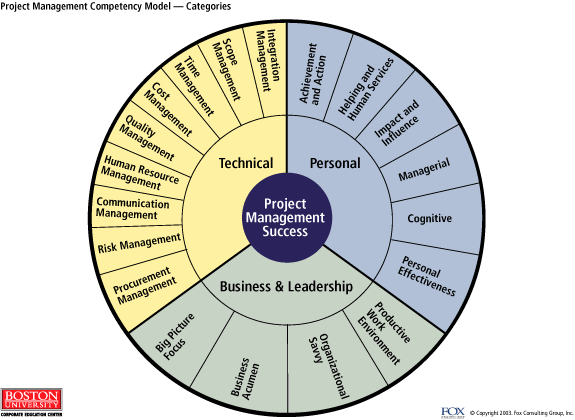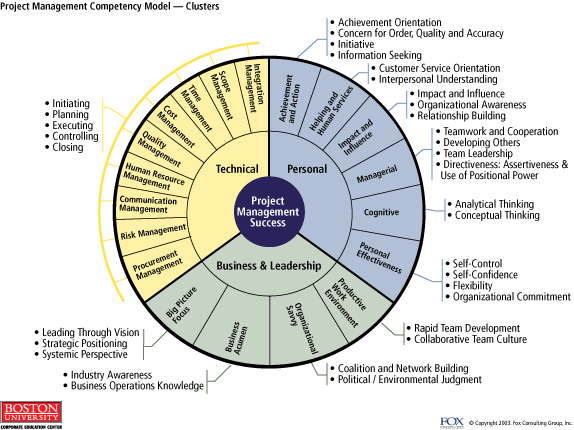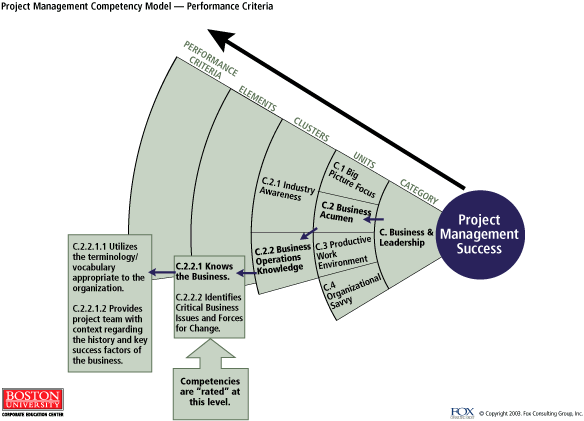The Art of Project Management
A Competency Model For Project Managers
Mark Gould and Rick Freeman
Project management is not only a science; it is also an art. Failure to understand the art of project management is costing corporate America billions of dollars, perhaps even hundreds of billions of dollars a year. The U.S. spends $2.3 trillion a year on projects, or about a quarter of the country s gross domestic product, according to The PMI Fact Book. Much of that money is wasted, because a large percentage of projects fail. The Standish Group International, Inc. reported in 2001 that 31% of all information technology (IT) projects were canceled before completion, that only 16% of projects were completed successfully, and that 88% of all projects were over budget, over schedule or both. Standish reported an average cost overrun of 189% and an average time overrun of 222% of original estimates. One explanation for the high failure rate is that many organizations have no process for managing projects consistently, or even for choosing project managers. They also have little idea what skills and personality traits are needed for project managers to succeed. Perhaps because project management is so closely associated with information technology (IT), many associate the term "project management" with technical skills. Corporations typically ensure that their employees have the technical skills they need to work on whatever tasks they are assigned, but, as Jim Johnson, Chairman of The Standish Group, has said, "When projects fail, it is rarely technical." Projects, like businesses, often fail because they are not properly managed. Managing a project may require technical knowledge, but, like managing a business, it also requires business knowledge. The project manager must be well organized and self-confident, and must have the right attitude. Technical knowledge is important, but so are business acumen, an understanding of the corporate culture and an ability to lead people to do what is expected of them. In other words, knowledge is important, but so is the ability to execute it.
Art Meets Science By developing expertise in the art, as well as the science of project management, project managers can increase the success rate for their projects, and will be better able to complete projects on time and on budget, without sacrificing quality. A new competency model developed by the Boston University Corporate Education Center (BUCEC) in conjunction with Fox Consulting, Inc. of Annapolis, Md. can help organizations determine the skills their project managers need, and plan their training and development to fill any gaps. The characteristics of a successful project manager are consistent, regardless of industry sector, corporate culture or other factors. The model captures the needed technical and personal skills, as well as business and leadership skills needed for project management success. An assessment tool can identify competency gaps, which can be filled by training and development. The model (see chart 1.) divides project management skills into three categories:
Technical
Business and leadership
Personal
 此主题相关图片如下: 此主题相关图片如下:

Think of project management as an iceberg. Above the water are technical skills, which are easy to measure and demonstrate. The art of project management is more difficult to measure. You have to find out how people work with other people to complete projects and build a competency model around their skills. To accomplish this, we have broken down the three skills categories into Clusters that further describe the specific behaviors required for successful project management (see chart 2.). The Clusters are divided into Units, which are broken into Elements and finally into Performance Criteria.
 此主题相关图片如下: 此主题相关图片如下:
 An individual who perfectly meets all of the criteria outlined in the model may not exist. However, the model can help identify candidates that embody many of the skills needed for project management competency, after which training can be used to fill any gaps. The model can also help identify development gaps in current project managers.
Technical Skills Technical competency is based on the nine widely accepted skills identified by the Project Management Institute that make up the Project Management Body of Knowledge (PMBOK®): integration management, scope management, time management, cost management, quality management, human resource management, communications management, risk management and procurement management. The project manager must understand: how to manage procurement and human resources, so that the resources needed to implement a project are available; risks, ranging from technical to political challenges that can ground a project; cost, time and quality, so that the project can be completed on time and on budget, while maintaining or exceeding the necessary quality; communications, so that progress is reported accurately and knowledge is shared with all stakeholders; scope management and integration management, so that the project is understood in its proper context and is aligned with business goals. The nine knowledge areas are needed to carry out 39 processes that make up the PMBOK®. Each process uses information from the previous process and enhances it before beginning the next process. These processes are divided into five phases: initiating, planning, executing, controlling and closing. These phases require both technical and business skills. Planning, for example, requires technical expertise to understand and implement the processes involved, but it also requires an understanding of business strategies. Tying the project to the overall business strategy and understanding its impact on the company s bottom line should be part of the planning phase.
Business and Leadership Skills Just as technical skills overlap with business skills, business skills outlined by the model require some technical competency. To be an effective communicator, for example, the project leader must understand technical language and jargon, but must also be able to translate such language into business strategies and objectives for non-technical management. Business and leadership skills are needed to link projects to the relationships, resources and infrastructure of the organization. These skills, as identified in the competency model, include:
A big picture focus
Business acumen
Organizational savvy
Productive work environment
These Clusters are defined by their corresponding Elements as follows: A "big picture" focus requires leading through vision, strategic positioning and a systematic perspective. "Leading through vision" and "strategic positioning" measure the success of a project manager, just as they measure the success of a chief executive officer. Project managers can not live in a silo. An effective leader must align the project with the needs of the enterprise. A "systematic perspective,the "science" part of this Cluster, integrates strategic planning with business processes. " Business acumen" divides into the Elements of industry awareness and business operations knowledge. Industry awareness relates to an individual s knowledge of the company position relative to its competitors. By comparing technology, marketing efforts, financial strength and management strength, project leaders should grasp the organization s competitive advantages and disadvantages. Business operations knowledge complements industry awareness, and is as internally focused as industry awareness is externally focused. It requires intimate knowledge of the company s culture, its organization, and its business processes and practices. In addition to understanding the business, the project manager needs to know how to change it. Organizational savvy requires an understanding of the company s politics and how to use them to advance the project. It also requires an ability to build coalitions and networks, which can create interdepartmental project support. While company resources can fund only a limited number of projects, it is important for project managers to remember that their co-workers are not their competitors. Project managers must be able to sell ideas, not only to their project team, but also throughout the organization. To accomplish this, they must understand how to motivate stakeholders. To create a productive work environment, the project manager must be able to rapidly develop an effective project team and establish a collaborative culture within the team. Speed is critical. Completing projects on time is the number one factor in determining project success, because it improves time-to-market, which can create a competitive advantage and increase market share.
Personal Characteristics Personal characteristics include:
Achievement and action
Helping and human services
Impact and influence
Managerial
Cognitive
Personal effectiveness An achievement-oriented person is typically someone who is always ready to take action, rather than procrastinating until just before a deadline. Such people seek the information they need to take action, rather than waiting for it to come to them. They show initiative, but maintain a concern for order, quality and accuracy. Helping and human services characteristics include a customer-service orientation and strong interpersonal understanding. The individual shows compassion, and would feel comfortable mentoring or coaching others. Project deadlines are met not only to satisfy managers, but also to satisfy customers. The ideal project manager is a role model, demonstrating a positive influence on other employees, and making an impact on their productivity and performance. Organizational awareness and the ability to build relationships are also part of this Cluster. The project leader must know who to go to for project resources and how to obtain those resources, which might otherwise be used for other projects. Managerial skills range from an ability to be assertive and use positional power effectively, to cooperation and teamwork. Team leadership, directness and an ability to develop others are other characteristics identified for this Cluster. Cognitive skills combine analytical and conceptual thinking, requiring a balance of right-brain and left-brain skills - a balance of art and science. Finally, personal effectiveness includes self-control, self-confidence, flexibility and organizational commitment. The effective project manager is loyal to the organization, the project team and the project goals. Effective project managers lead by doing.
Performance Criteria The three categories of skills needed for project management success have been divided into Units, and the Units have been divided into Clusters. These Clusters can be further divided into Elements, which can finally be divided into Performance Criteria. For example, within the "business and leadership" Category, the "business acumen" Unit includes the Clusters of "industry awareness" and "business operations knowledge." The Elements of business operations knowledge include general knowledge of the business, and the ability to identify critical business issues and forces for change. The element "business knowledge" can be divided into the following Performance Criteria (see chart 3.): uses the terminology and vocabulary appropriate to the organization, and provides the project team with context regarding the history and key success factors of the business.
 此主题相关图片如下: 此主题相关图片如下:

These skills enable the project manager to make the project meaningful for all team members, while enhancing their understanding of their role. Most important, the project manager helps team members understand why they are undertaking the project by relating it to the organization s business strategy.
Competency Assessment Identifying the competencies needed for successful project management would have limited use without a tool for assessing these competencies. Competencies can be assessed based on employee performance, and answers to situational questions designed to gauge employee competencies. Results of assessment at the Elements level can be gathered and rated, based on the following scale: Unaware. Do not recognize this knowledge or skill in the candidate.
Aware. Candidate has knowledge and is familiar with the concepts, but has not applied the knowledge to a real situation.
Functional. Candidate applies knowledge or skill to routine situations, occasionally requiring guidance.
Proficient. Candidate exercises a breadth of knowledge and skills to address complex situations without guidance.
Expert. Candidate coaches and supports others using a breadth of experience or specialized depth of expertise. As with any project, the best way to measure the success of a project manager is by return on investment. An organization that wants to measure ROI after adopting the Project Management Competency Model should benchmark the success or failure rate of previous projects and compare it with results after adopting the model.
|





